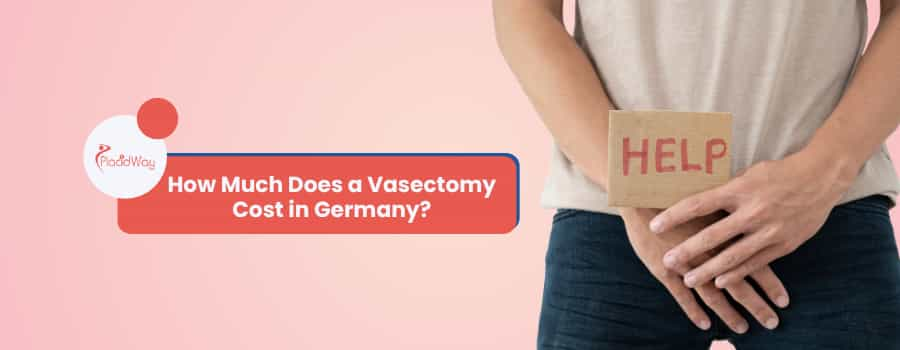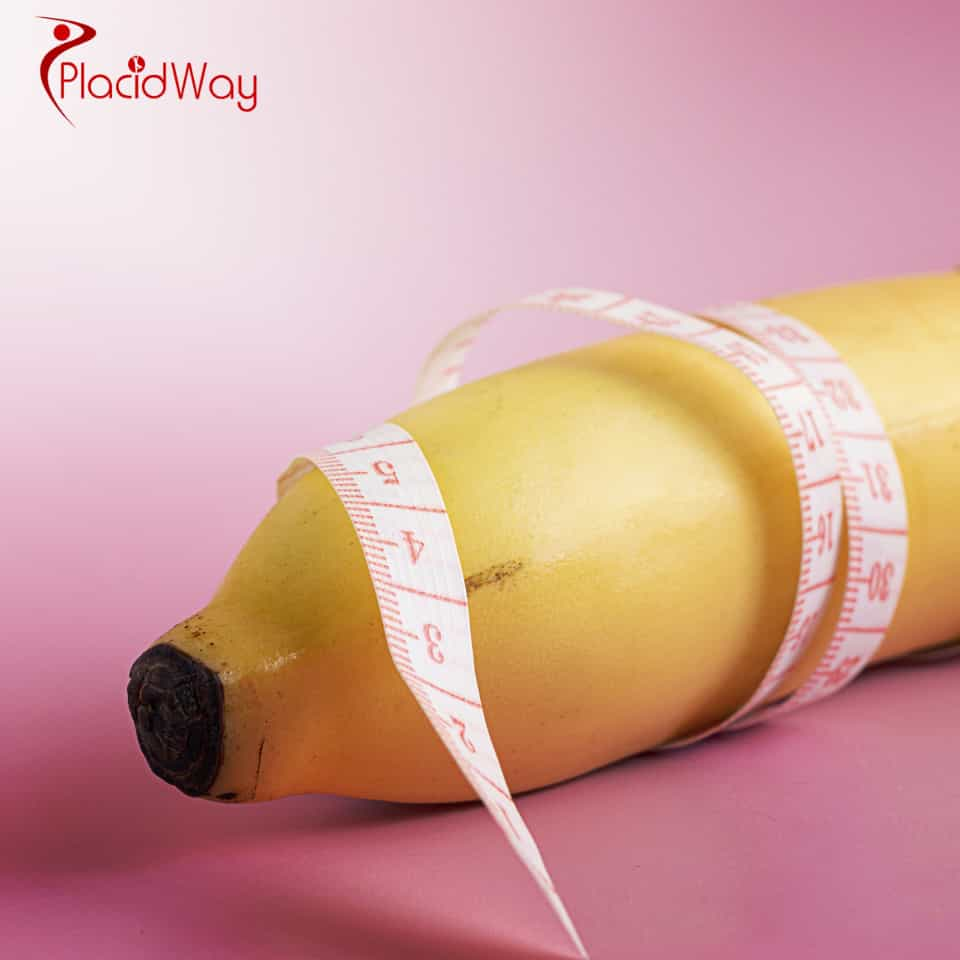A Guide to Vasectomy Cost in Germany

Considering a vasectomy for permanent birth control is a big decision, and understanding the financial aspects is key. In Germany, a vasectomy is a common and effective male sterilization procedure, chosen by many for its high success rate and convenience.
This guide covers the cost of a vasectomy in Germany, including typical prices, influencing factors, and insurance coverage. We'll also address common questions about the procedure, recovery, and success rates, providing clear, expert answers to help you make an informed choice.
How much does a vasectomy typically cost in Germany?
The average cost for a vasectomy in Germany is typically €500 to €550. This price usually covers the entire process: initial consultation, the procedure itself, and required follow-up semen analyses to confirm sterility. While this is an average, individual clinic prices may vary. This cost is generally an out-of-pocket expense, as statutory health insurance in Germany typically does not cover vasectomies, classifying them as an elective contraceptive service.
Are vasectomies covered by health insurance in Germany?
In Germany, vasectomies are usually not covered by public or private health insurance. This is because they are considered a form of contraception, not a medically necessary treatment. Patients typically pay the full cost themselves. Rare exceptions might apply if a vasectomy is medically necessary for a severe health reason, but this is uncommon. Always confirm with your insurance provider, but expect to pay out of pocket.
What factors influence the cost of a vasectomy in Germany?
Several factors can influence the final cost of a vasectomy in Germany:
- Clinic Location: Prices may vary slightly by city or region.
- Surgeon's Experience: Highly experienced urologists or specialized centers may charge more.
- Procedure Type: While the no-scalpel vasectomy is common, different techniques might have minor cost impacts.
- Inclusions: The quoted price should ideally include the initial consultation, the procedure, local anesthesia, post-operative care, and follow-up semen analyses. Always clarify what's included to avoid hidden fees.
- Complications: Rare unforeseen complications requiring extra attention might incur additional costs.
What is included in the typical vasectomy cost in Germany?
A vasectomy in Germany typically includes a comprehensive package of services:
- Initial Consultation: The urologist discusses the procedure, assesses your medical history, confirms suitability, and explains the permanent nature of the decision.
- The Vasectomy Procedure: This covers the outpatient surgical intervention.
- Anesthesia: Local anesthesia to numb the area is included.
- Post-operative Care Instructions: You'll receive guidelines for incision care, discomfort management, and activity restrictions.
- Follow-up Semen Analyses (Spermiograms): These vital tests confirm sterility by checking for sperm absence at specified intervals (e.g., after 12 weeks and 20 ejaculations). Their cost is generally part of the overall package.
How long does a vasectomy procedure take in Germany?
The actual vasectomy procedure in Germany is quick, usually taking 15 to 30 minutes. It's a minor, outpatient surgery, so no overnight hospital stay is needed. This short duration makes it a convenient and efficient permanent contraception option. Allow extra time for preparation, anesthesia to take effect, and a brief recovery at the clinic before discharge.
What is the recovery time after a vasectomy in Germany?
Recovery time after a vasectomy in Germany is generally quick. Expect mild discomfort, swelling, or bruising in the scrotum, manageable with over-the-counter pain relievers. For the first 24-48 hours, rest and avoid strenuous activities, sexual activity, and heavy lifting. Within 1-2 days, most men can resume light work. Wear supportive underwear for about a week. Full recovery, including all normal activities, usually takes 2 to 4 weeks. Always follow your urologist's instructions, and remember, sterility is not immediate; follow-up semen analyses are required.
What is the success rate of a vasectomy in Germany?
The success rate of a vasectomy in Germany is extremely high, over 99%, making it one of the most reliable contraceptive methods. It's crucial to know that sterility isn't immediate. Sperm can remain in the vas deferens for some time. Therefore, continue using other contraception until your urologist confirms sterility with semen analysis, typically involving multiple samples over weeks or months.
What are the potential risks and side effects of a vasectomy?
A vasectomy is very safe, but like any surgery, carries minor, infrequent risks:
- Common: Minor pain, swelling, and bruising, usually resolving within a week.
- Less Common: Bleeding/hematoma, infection (rare, look for increased pain, redness, warmth, pus), sperm granuloma (small, harmless lump from sperm leakage), or chronic testicular pain (rare but persistent).
- Extremely Rare: Recanalization, where severed vas deferens rejoin, allowing sperm passage; this is why follow-up semen analyses are crucial.
Your urologist will discuss all risks during your consultation.
What should I expect during a vasectomy consultation in Germany?
The vasectomy consultation in Germany is a vital first step to ensure the procedure is right for you. Expect:
- Procedure Details: The urologist will explain the vasectomy process, anesthesia (local), and what happens during surgery.
- Permanence Discussion: The doctor will emphasize the permanent nature of birth control and discuss implications like potential future regret.
- Medical Assessment: Your medical history, allergies, and medications will be reviewed, followed by a brief physical exam to locate the vas deferens.
- Risks & Benefits: Potential risks, side effects, and benefits compared to other contraception will be outlined.
- Q&A: You'll have ample opportunity to ask questions.
- Consent: If you proceed, you'll sign a consent form confirming your understanding.
Are there different types of vasectomy procedures in Germany?
While the goal of blocking the vas deferens is constant, different vasectomy techniques exist in Germany. The most common and preferred method is the no-scalpel vasectomy (NSV). This minimally invasive technique uses a tiny puncture instead of an incision, gently bringing the vas deferens through, cutting, and sealing them. NSV typically results in less bleeding, a smaller wound, and quicker recovery than conventional (scalpel) vasectomy, which involves small incisions closed with stitches. Many German clinics primarily offer NSV due to its advantages. Your urologist will discuss their specific technique.
How long until a man is sterile after a vasectomy?
A man is not immediately sterile after a vasectomy. Sperm already present beyond the severed vas deferens can still be ejaculated. Sterility typically takes about 12 weeks, or 20 to 30 ejaculations, for all residual sperm to clear. Semen analyses (spermiograms) are essential to confirm complete absence of sperm (azoospermia). You must continue using other contraception until your urologist confirms sterility. This waiting period and follow-up tests are crucial to ensure success and prevent unplanned pregnancy.
Can a vasectomy be reversed in Germany, and what is the cost?
Yes, a vasectomy can be reversed in Germany via a complex microsurgical procedure called a vasovasostomy or vasoepididymostomy. This involves reconnecting the severed vas deferens and requires specialized skills. The cost is significantly higher than a vasectomy, starting at €2,000 and generally not covered by health insurance. Success rates vary based on time since vasectomy, original procedure type, surgeon's expertise, and scar tissue. Even if sperm return, pregnancy isn't guaranteed. Always consider a vasectomy a permanent decision.
Where can I find a qualified urologist for a vasectomy in Germany?
Finding a qualified urologist for a vasectomy in Germany is straightforward. Use online search portals like "WhatClinic" or "Bookimed," which list urologists and clinics with patient reviews. Professional medical associations, such as the German Society of Urology (DGU), can also provide certified lists. Your general practitioner is a trusted source for local recommendations. In larger cities, specialized "Vasectomy Centers" offer focused expertise. When choosing, consider their experience, patient reviews, and whether they offer the no-scalpel technique.
What is the difference between a vasectomy and male sterilization?
Vasectomy is the specific surgical procedure that achieves male sterilization. During a vasectomy, the vas deferens (sperm-carrying tubes) are cut or blocked. Male sterilization is the resulting state where a man is permanently infertile, meaning his semen no longer contains sperm. Essentially, a vasectomy is the method used to achieve male sterilization.
Does a vasectomy affect sexual function or libido?
A vasectomy does not affect a man's sexual function, libido (sex drive), ability to achieve an erection, or ejaculation. Testicles continue to produce sperm (which are reabsorbed) and male hormones like testosterone, so libido and erections remain unchanged. Ejaculation still occurs with virtually the same volume, as sperm make up only about 5% of semen. Orgasm sensation is also unaffected. Many couples find their sex life improves due to the absence of pregnancy worries.
What is the long-term outlook after a vasectomy?
The long-term outlook after a vasectomy is overwhelmingly positive. It provides a highly effective, permanent birth control method, simplifying family planning. Once sterility is confirmed, it offers nearly 100% contraception. There are no proven long-term adverse health impacts, such as increased cancer risk. Sexual function, libido, and ejaculation remain unaffected, often leading to increased spontaneity. The body harmlessly reabsorbs produced sperm. While rare, chronic testicular pain can occur, requiring urologist consultation. Overall, a vasectomy is a safe, effective, and convenient long-term solution for men certain about not desiring future biological children.
Is a vasectomy a painful procedure?
A vasectomy is generally not painful during the procedure, as it's performed under local anesthesia. You'll feel a brief sting from the anesthetic injection, which is usually the most uncomfortable part. Once numb, you should only feel pressure or tugging, not sharp pain. After the anesthetic wears off, mild to moderate discomfort, aching, or soreness is common, manageable with over-the-counter pain relievers, and typically subsides within a few days. Swelling and bruising are also common but temporary. Most men describe post-procedure discomfort as manageable.
How do I prepare for a vasectomy in Germany?
Proper preparation for a vasectomy in Germany ensures a smooth procedure and recovery. Your urologist will give specific instructions, but generally:
- Shaving: Shave or trim scrotal/groin hair a day or two before.
- Hygiene: Shower on the procedure day.
- Medications: Inform your doctor about all medications, especially blood thinners; you may need to stop them temporarily.
- Comfort: Wear loose clothing and supportive underwear.
- Transport: Arrange for someone to drive you home.
- Food/Drink: Usually, you can eat and drink normally.
- Questions: Prepare any last-minute questions.
Following these steps enhances comfort and safety.
What is the role of semen analysis after a vasectomy?
Semen analysis (spermiogram) is critical after a vasectomy to confirm sterility. Its purpose is to check for sperm in your ejaculate under a microscope. Since sperm can remain post-procedure, you'll provide samples around 12 weeks after, or after 20-30 ejaculations. Only when no sperm are found (azoospermia) will your urologist confirm sterility. Until then, use other contraception. This test provides peace of mind, confirming the vasectomy's permanent contraceptive effect.
Are there any alternatives to vasectomy for male contraception?
While vasectomy is the most effective permanent male contraception, other options exist, though less permanent or convenient. Condoms are widely available and effective for temporary contraception, also protecting against STIs. The withdrawal method is highly unreliable. Future methods like hormonal male contraception (pills/gels) and non-hormonal options (e.g., RISUG, Vasalgel) are under development but not yet widely available. For highly effective, permanent male contraception, vasectomy remains the standard.
How does a vasectomy compare to female sterilization (tubal ligation)?
Comparing vasectomy to female sterilization (tubal ligation) reveals why vasectomy is often preferred for permanent contraception:
| Feature | Vasectomy (Male Sterilization) | Tubal Ligation (Female Sterilization) |
|---|---|---|
| Procedure | Outpatient, 15-30 mins, local anesthesia. | Outpatient, 30-60 mins, often general anesthesia. |
| Invasiveness | Minimally invasive (no-scalpel), small puncture/incision. | More invasive, abdominal incisions (laparoscopy/mini-laparotomy). |
| Cost | Less expensive (approx. €500-€550 in Germany). | More expensive (€1,000+). |
| Recovery | Quicker, few days rest, 1-2 weeks light activity. | Longer, several days significant discomfort, longer full activity. |
| Risks | Lower (minor pain, swelling, rare infection). | Higher (infection, bleeding, organ damage, anesthesia risks). |
| Effectiveness | Over 99% effective once confirmed. | Over 99% effective. |
| Reversibility | Possible but complex, expensive, not always successful. | Much more complex, expensive, often less successful. |
In summary, vasectomy is generally safer, simpler, less invasive, and more cost-effective, with similar high effectiveness.
What are the psychological aspects of undergoing a vasectomy?
The psychological aspects of undergoing a vasectomy are important. For most men, outcomes are positive:
- Relief & Reduced Anxiety: Many experience significant relief from pregnancy worries, leading to more relaxed sexual intimacy.
- Increased Sexual Satisfaction: Removing contraception pressure can improve sexual enjoyment.
- Empowerment: Taking contraceptive responsibility can feel empowering.
- High Satisfaction: Studies show high satisfaction rates, with rare regret.
- Rare Regret: Regret is uncommon, usually tied to life changes (new partner, desire for more children). Thorough pre-procedure counseling is vital.
- Masculinity Concerns: Initial concerns about masculinity are typically unfounded, as the procedure doesn't affect sexual function or hormones.
Open communication with your partner and urologist helps address psychological concerns.
Are there age restrictions for a vasectomy in Germany?
In Germany, there are no strict legal age restrictions for a vasectomy. However, most urologists recommend it for men over 30 who have completed their family planning, ensuring a well-considered decision due to its permanence. Younger men or those without children will receive extensive counseling to confirm their understanding of the permanent implications and future possibilities. Some clinics might require psychological assessments in such cases. The focus is always on informed consent and the patient's maturity for this permanent reproductive health decision.
What is the post-vasectomy care like in Germany?
Post-vasectomy care in Germany is vital for recovery and confirming success. Your urologist will provide detailed instructions, including:
- Rest: Take it easy for 24-48 hours; avoid strenuous activity, heavy lifting, or vigorous exercise for at least a week.
- Pain Management: Use over-the-counter pain relievers for mild discomfort.
- Ice Packs: Apply ice to the scrotum for the first 24-48 hours to reduce swelling.
- Supportive Underwear: Wear tight-fitting underwear for about a week.
- Hygiene: Shower after 24-48 hours; avoid baths/swimming until healed.
- Sexual Activity: Avoid for at least 3-7 days, or as advised.
- Follow-up Semen Analyses: Crucial for confirming sterility (e.g., 12 weeks post-procedure, or after 20-30 ejaculations); continue contraception until confirmed.
- Monitor Complications: Watch for excessive swelling, severe pain, fever, redness, or discharge, and contact your urologist if needed.
Diligently following these instructions ensures a successful outcome and comfortable recovery.
Explore PlacidWay for solutions related to medical tourism, healthcare services, or other relevant offerings.


.png)




.png)

.png)






Share this listing